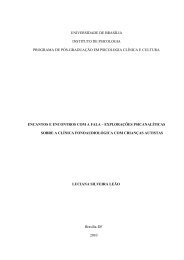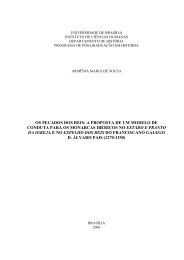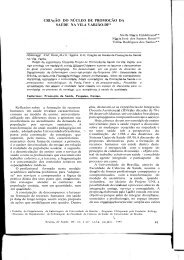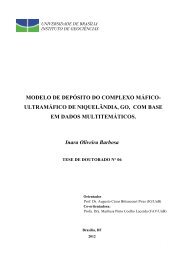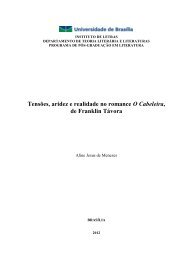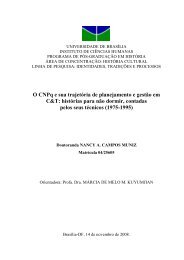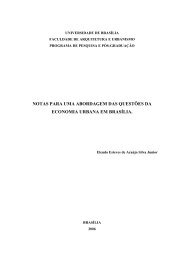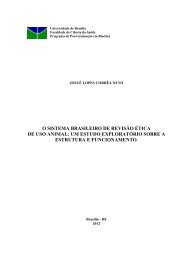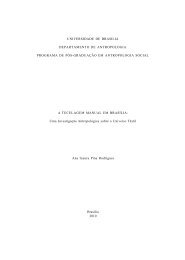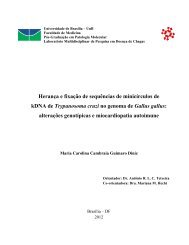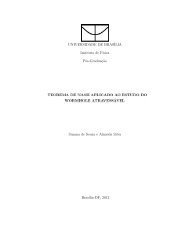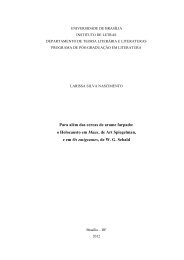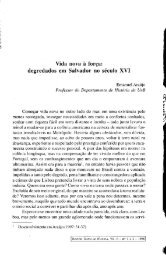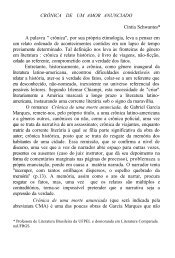As determinantes locais da paradiplomacia: o caso dos municípios ...
As determinantes locais da paradiplomacia: o caso dos municípios ...
As determinantes locais da paradiplomacia: o caso dos municípios ...
You also want an ePaper? Increase the reach of your titles
YUMPU automatically turns print PDFs into web optimized ePapers that Google loves.
115<br />
There is a third type of paradiplomacy that is driven primarily by political and cultural<br />
considerations, although the economic dimension is certainly not absent. This paradiplomacy features<br />
prominently the international expression of an identity distinct from the one projected by the central state.<br />
It tends to be very ambitious; this is not always manifested in the scope of its networks (some are fairly<br />
specifically targeted) but in the logic driving the international ventures. Here, regional governments seek<br />
to develop a set of international relations that will affirm the cultural distinctiveness, political autonomy,<br />
and, indeed, the national character of the community they represent. (LECOURS, 2007, p. 119, 120)<br />
Apesar de esses <strong>caso</strong>s serem minoria no universo <strong>da</strong>s ativi<strong>da</strong>des paradiplomáticas,<br />
eles se destacam pelo fato de estarem presentes nos exemplos mais desenvolvi<strong>dos</strong> e bem<br />
sucedi<strong>dos</strong> de relações transnacionais de regiões. Nesse sentido,<br />
Nationalism is no doubt one of the most significant variables, yet it remains one of the most neglected in<br />
relation to the study of paradiplomacy. Minority nations that plan international strategies within<br />
multicultural states are a well-known and quite common phenomenon. The most active sub-state powers<br />
in the field of international relations (Flanders, Walloonie, Quebec, Catalonia, the Basque Homeland) all<br />
share a single attribute: nationalism. (LACHAPELLE e PAQUIN, 2005, p. 82).<br />
Lecours (2008, p. 119) pensa <strong>da</strong> mesma forma ao apontar que “the Basque Country,<br />
as well as other cases of multidimensional and ambitious paradiplomacy such as in Cataluña,<br />
Quebec, and Flanders, all share one underlying feature: nationalism”. Baseado nos exemplos<br />
de regiões cita<strong>da</strong>s pelos autores pode-se identificar que essa variável, mesmo que restrita a<br />
poucos <strong>caso</strong>s, é fun<strong>da</strong>mental para entender a <strong>paradiplomacia</strong> <strong>da</strong>s regiões que mais<br />
desenvolveram ativi<strong>da</strong>des desse tipo.<br />
Mostrar-se-á em um <strong>caso</strong> específico, o do País Basco, como essa determinante se<br />
relaciona com a <strong>paradiplomacia</strong>. A região já foi alvo de alguns estu<strong>dos</strong> e serve de exemplo de<br />
como a identi<strong>da</strong>de e a cultura, que em alguns <strong>caso</strong>s resultam no nacionalismo, levam à<br />
ativi<strong>da</strong>de paradiplomática.<br />
Para Lecours,<br />
Basque paradiplomacy is primarily about identity politics. This is not to say that this paradiplomacy is not<br />
concerned with achieving economic gains through, for example, the facilitation of exports, but only that<br />
its scope and intensity are a function of nationalism. The idea of a connection between identity and<br />
paradiplomacy does not mean that distinctive collective identities necessarily lead to cases of<br />
paradiplomacy such as the Basque Country’s. In other words, the (…) argument is not that the Basque<br />
Country conducts international relations because many Basques feel more Basque than Spanish; this<br />
would be an oversimplification. Rather, the idea put forward here is that the development of foreign<br />
affairs by the Autonomous Community of the Basque Country is the consequence of a nationalist<br />
movement.” (LECOURS, 2007, p. 114, 115).<br />
Há um contexto histórico próprio no surgimento e no desenvolvimento <strong>da</strong><br />
<strong>paradiplomacia</strong> basca, assim como nos outros <strong>caso</strong>s supracita<strong>dos</strong>. Esse contexto é<br />
fun<strong>da</strong>mentalmente, mas não unicamente, baseado em uma noção identitária própria e<br />
diferencia<strong>da</strong> <strong>da</strong> do governo central. O nacionalismo presente na região possui várias



